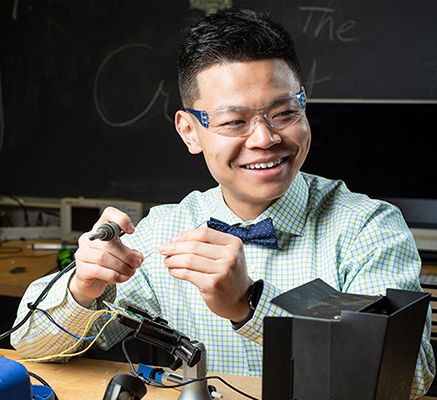International student Hansen Liang ’19 M.Eng. changed his trajectory—aligning his career path with his passions—through Lehigh’s Technical Entrepreneurship professional master’s program
- Product Manager, Klaviyo, Inc. (Boston, MA)
- M.Eng., Technical Entrepreneurship, Lehigh University, 2019
- B.S., Electrical and Computer Engineering, Lafayette College, 2015
One of the most important features of Lehigh University’s professional master’s program in Technical Entrepreneurship, according to alum Hansen Liang?
“It’s a safe place to fail.”
Not long into his career as an electrical engineer who doubled as a project manager, Liang felt the itch to seek out that kind of environment—one that would let him take risks, try something new, and fulfill his ambitions.
Today, after completing Lehigh’s 11-month, in-residence program that teaches technology innovation, he’s a product manager at one of Boston’s hottest startups—Klayvio—an e-commerce marketing company that made the Forbes Cloud 100 list in 2019. And he credits his master’s degree with helping him align his career path with his true passion—designing, building, and growing products.
“It’s easy for all of us to get lost in the day to day of whatever job we are doing,” he says. “It’s easy to constantly be racing against deadlines, always swimming ahead, without ever having time to raise your head above the water and ask, ‘Why am I swimming?’”
Liang started asking himself that question three years into his job at a lighting control manufacturer, where he’d landed after graduating from Lafayette College.
“I think a lot of us hit a point in our lives where we are like, ‘This is good, this is known,’ but you get a sense that you could be doing something you are more excited about.”
Liang had always been fascinated by product creation: “I wanted to know why a product is built the way it is, why it’s built at a certain price point, and what makes it a good design.”
Though his role allowed him to touch on these questions, he wanted more freedom and flexibility to build something from scratch—as well as the room to make mistakes. That’s what sparked his move from the corporate world back to school to pursue a master’s degree in Technical Entrepreneurship (TE). Students in the program learn by experiencing the idea-to-venture process in an educational environment that's hard-wired to support the development of novel, innovative, and commercially viable technologies.
“I came into this program treating it like a sandbox,” Liang says. As part of the curriculum, he had the ability to dream up products, pitch them to teammates, and start to build them.
Experiencing failure was also a big part of the learning process.
“I had this idea to make a haptic wrist rest for PC video games,” he says. He was able to partner with fellow students and attempt to build a prototype. But, the idea fizzled. “I think it takes the right expertise to really execute on that technology,” he says.
Still, the fact that he and his peers were able to construct and test a prototype proves a valuable lesson taught by the program, Liang says. “Bias toward action.”
“If, for example, you have a crazy idea, I think most people would normally throw their hands up and not even start,” he says. “What if I said I wanted to design an electric car that holds 10 people? I would never be able to do that. But this program teaches you that anyone can do the basic version of anything. You just need to prove if there is a market for it. You don’t have to be a car designer. You just need to answer that question. You can use all these tools and build a team that can design that car.
“You don’t have to just stare at your arms and be like, ‘I can’t do that.’ This program shows you that you can build anything.”
As an international student, Liang says an emphasis on this mindset was especially valuable. “This program is a great way to be exposed to the entrepreneurial spirit and business community in the U.S.,” he says. “This is a good way to cross-pollinate and to get some new ideas in a new environment and to also share our knowledge and experiences.”
The degree also opened the door for Liang to find even more job opportunities in the U.S. With the end of the program approaching, Liang started networking (a key skill taught and refined throughout the year). He connected with an alum from his undergraduate studies, which sparked a conversation that led to his current position.
At Klayvio, he has the freedom to solve problems, talk directly with customers, and build new features from scratch. It’s a career change that wouldn’t have been possible without taking a risk and learning how to fail.
Connect with Hansen via his Linked In profile.
—Kit Fox is a freelance contributor for the P.C. Rossin College of Engineering and Applied Science

